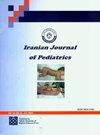Evaluation of Swallowing Coordination in Infants with a History of Mechanical Ventilation Longer Than 7 Days in the Neonatal Period and Assessment of Response to Oral Stimulation Maneuver
IF 0.4
4区 医学
Q4 PEDIATRICS
引用次数: 0
Abstract
Background: Dysphagia is a frequent complication defined as difficulty in any stage of swallowing. Infants with a history of mechanical ventilation might show difficulty in coordinating pharyngeal muscles resulting in dysphagia. Objectives: The present study aimed to show the prevalence of swallowing disorders and associated symptoms among high-risk infants with a history of prolonged mechanical ventilation. Methods: A quasi-experimental study was conducted at the Breastfeeding Research Center, Tehran, Iran. All the neonates with a history of prolonged mechanical ventilation entered the study. Parents were asked to respond to a provided questionnaire regarding their infants’ swallowing disorders. Accordingly, the infants with any symptoms were considered candidates for intervention. The parents also received simple training to perform oral sensorimotor stimulation protocol for their children. Through a follow-up visit, the questionnaire was filled up for every infant. Finally, all the data related to the responses before and after interventions were compared to show the possible effects of the interventions. Results: A total of 25 infants entered the study. The mean mechanical ventilation period was 15.95 ± 6.644 days. Concerning the frequency of swallowing complications, 24 infants (96%) had different degrees of dysphagia. After 3 - 6 months of interventions, the number of cases with symptoms of coughing (P = 0.016), spitting food out by mouth (P = 0.0001), choking (P = 0.016), humid breath (P = 0.031), poor weight gain (P = 0.002), and the need to cut food into small pieces (P = 0.004) was significantly lower than the number of cases suffering from such complications before the intervention. The results also showed that after 3 - 6 months of interventions, dysphagia symptoms in 10 out of 24 infants (41.66%) entirely and in others (38.44%) partially improved. Conclusions: The results of the present study delineated that infants with a history of prolonged mechanical ventilation were at greater risk of swallowing complications. The early diagnosis and implementation of oral sensorimotor interventions could improve different symptoms of dysphagia.新生儿期机械通气史超过7天的婴儿吞咽协调能力评估及对口服刺激手法的反应评估
背景:吞咽困难是一种常见的并发症,定义为吞咽任何阶段的困难。有机械通气史的婴儿可能表现出咽肌协调困难,导致吞咽困难。目的:本研究旨在显示有长期机械通气史的高危婴儿中吞咽障碍及相关症状的患病率。方法:在伊朗德黑兰母乳喂养研究中心进行准实验研究。所有有长期机械通气史的新生儿均进入研究。父母被要求回答一份关于婴儿吞咽障碍的问卷。因此,有任何症状的婴儿都被认为是干预的候选人。父母还接受了简单的训练,为他们的孩子执行口腔感觉运动刺激方案。通过随访,每个婴儿都填写了问卷。最后,将所有与干预前后反应相关的数据进行比较,以显示干预可能产生的效果。结果:共有25名婴儿进入研究。平均机械通气时间15.95±6.644 d。在吞咽并发症发生率方面,有24例(96%)患儿存在不同程度的吞咽困难。干预3 ~ 6个月后,出现咳嗽(P = 0.016)、口吐食物(P = 0.0001)、窒息(P = 0.016)、呼吸潮湿(P = 0.031)、体重增加不明显(P = 0.002)、需要将食物切成小块(P = 0.004)等症状的病例数明显低于干预前。结果还显示,干预3 - 6个月后,24名婴儿中有10名(41.66%)吞咽困难症状完全改善,其余(38.44%)部分改善。结论:本研究的结果表明,有长期机械通气史的婴儿发生吞咽并发症的风险更大。早期诊断和实施口腔感觉运动干预可以改善吞咽困难的不同症状。
本文章由计算机程序翻译,如有差异,请以英文原文为准。
求助全文
约1分钟内获得全文
求助全文
来源期刊
CiteScore
0.90
自引率
20.00%
发文量
75
审稿时长
6-12 weeks
期刊介绍:
Iranian Journal of Pediatrics (Iran J Pediatr) is a peer-reviewed medical publication. The purpose of Iran J Pediatr is to increase knowledge, stimulate research in all fields of Pediatrics, and promote better management of pediatric patients. To achieve the goals, the journal publishes basic, biomedical, and clinical investigations on prevalent diseases relevant to pediatrics. The acceptance criteria for all papers are the quality and originality of the research and their significance to our readership. Except where otherwise stated, manuscripts are peer-reviewed by minimum three anonymous reviewers. The Editorial Board reserves the right to refuse any material for publication and advises that authors should retain copies of submitted manuscripts and correspondence as the material cannot be returned. Final acceptance or rejection rests with the Editors.

 求助内容:
求助内容: 应助结果提醒方式:
应助结果提醒方式:


